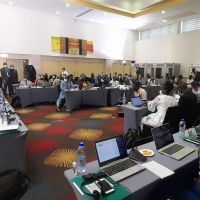EU to halve plastic-bag use by 2019
Ez is érdekelhet

A deal struck earlier this week between the European Parliament and member states to phase out the use of plastic carrier bags was confirmed today (21 November) by the Council of Ministers.
The new EU law will require governments to cut annual use of lightweight plastic bags to 90 per person by the end of 2019. That number will have to be cut to 40 bags per person by the end of 2025. This represents a reduction from current use of 50% by the end of 2019 and 80% by the end of 2025. Average consumption of single-use plastic bags was 176 bags per person in 2010.
Member states have been given the option of introducing mandatory charges for plastic bags instead of meeting the targets. The charges, which could come in the form of taxation, must be in place by 2017. The legislation does not cover lightweight plastic bags used for fruit and vegetables. The legislation also allows member states to ban plastic bags without violating EU single market or plastics waste rules. The legal situation of these national bans, which are in place in some countries, including Italy, has until now been unclear.
The legislation was thrown into doubt on Monday night (17 November) when the Commission representative present at the talks suggested, after the deal had been reached, that the Commission might veto it. However there was unanimous support for the deal in the Council. Frans Timmermans, the Commission first vice-president, acknowledged on Wednesday (19 November) that unanimity in the Council “would make irrelevant the position of the Commission”. He had identified the legislation as a possible example of what he has been asked to eliminate in his role overseeing ‘better regulation’.
“Despite brinksmanship from numerous governments and the Commission’s recalcitrant stand throughout the negotiations, we have agreed binding EU rules on reducing plastic bag use,” said Margrethe Auken, the Green MEP who was leading negotiations for the Parliament, after today’s ratification by member states.
“Given plastic waste respects no borders, notably in waterways, there is a clear argument for Europe-wide regulation,” she added. “Using regulation to reduce plastic bag use, with the myriad of environmental problems this causes, has proved a major success and it is common sense to regulate this at EU level.”
However, the plastics industry is concerned that national bans in some member states but not others will result in a patchwork of regimes that will disrupt the EU common market.
“The possibility to ban plastics bags goes against the general principle of the packaging and packaging waste directive,” said Karl-H. Foerster, executive director of industry association PlasticsEurope. “It is concerning as it opens the door for member states to ban not only plastics bags but other types of packaging as well. Such an inconsistent political framework that would allow member states to introduce different regulations on packaging would hinder investments and innovation and would create barriers to trade in packaged goods in Europe.”
An attempt by the Parliament to insert a ban on oxo-biodegradable plastic bags was rejected by member states and is not part of the deal. The UK government led opposition to the ban, and was backed by several central and eastern European member states. Environmental campaigners said these bags present a danger because although they break down into small parts, those small parts are not biodegradable.
But the UK-based company that makes most of these types of bags, Symphony Environmental, disputes this. The Oxo-Biodegradable Plastics Association says the ban was orchestrated by lobbyists for the vegetable-based plastics industry, which is largely based in Italy. “It is no surprise that four of the six members of the EP delegation for the trialogue are Italians,” the association said in a statement.
Auken disagrees, and said MEPs will continue pushing for a ban on these types of bags. “These plastic bags worsen the litter problem by fragmenting into micro-plastics, polluting the environment and hindering composting and recycling,” she said. “The only real beneficiary of this is one small company in the UK. Despite clear evidence on the problems of these bags, we will have to wait for further EU action on this problem.”
Source: europeanvoice.com







